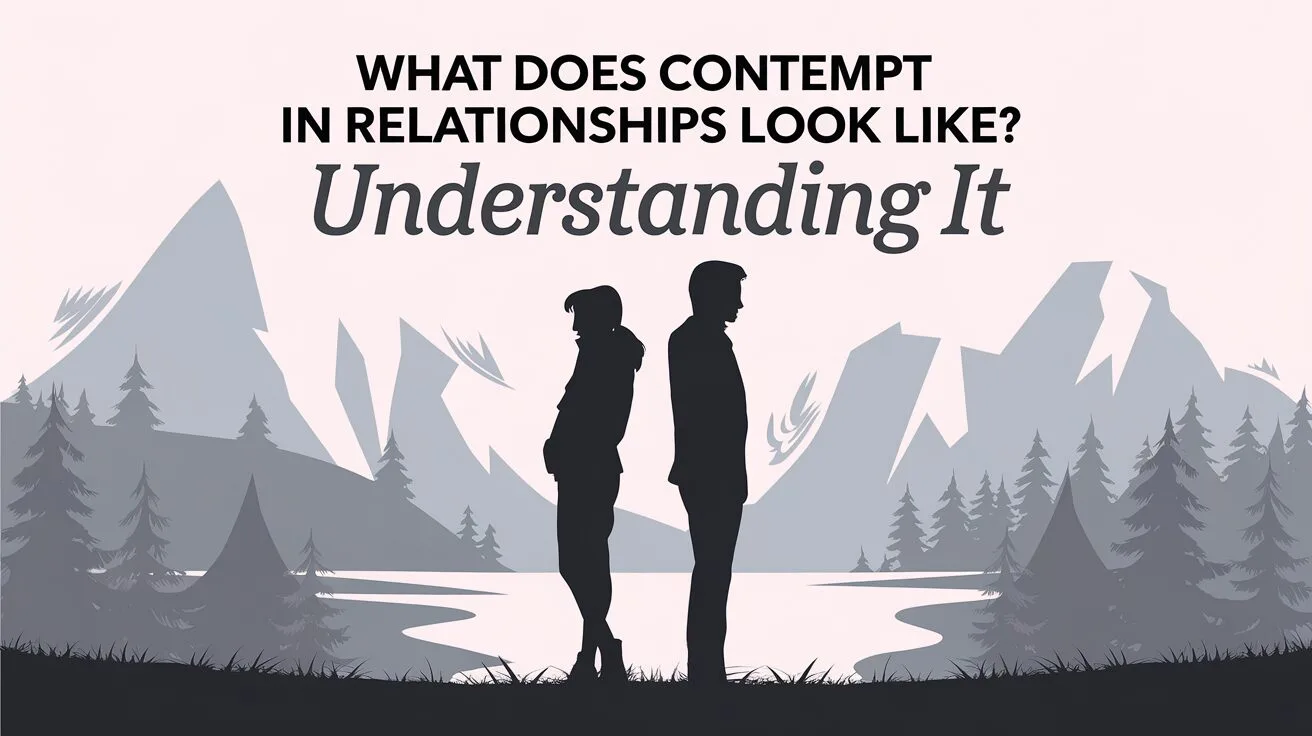Key Takeaways
Contempt is a damaging emotion in relationships. It breeds disrespect, slowly eating away at the core of mutual respect and understanding.
To recognize contempt, carefully listen to what someone says and watch what they do. Watch out for cues such as sarcasm, eye-rolling, and mocking behavior, which are all signs the person feels superior and resentful.
Contempt is often the result of unhealed conflict and unfulfilled emotional need. It builds up because of negativity from past grievances and a break in communications.
Contempt can destroy relationships. It erodes intimacy, creates conflict, and can ultimately lead to a breakdown.
Strategies to overcome contempt involve open communication, empathy-building exercises, and focusing on positive interactions to rebuild trust and respect.
Professional guidance, such as psychotherapy, can offer tailored strategies and support. This approach helps partners resolve underlying issues, which leads to healthier, more respectful relationships.
Many of the men we work with cite contempt as the main reason for divorce. That is why spotting contempt in relationships matters. It sneaks in as sarcasm, eye rolls, and hostile humor. These signs can harm bonds and make love hard to find. To address contempt, identify it initially. Don’t stew on it; don’t sit in negativity. Work on communication and understanding one another. Sometimes, issues run deep. Turning to a couples therapist provides clarity. Therapy helps you work through contempt and heal those bonds. At Denver Men’s Therapy, we help men regain control and find healthier relationships. Learn how to cultivate the right relationships and prosper together.
What is Contempt?
Definition of Contempt
Contempt is a combination of disdain, superiority, and negative emotions that can seriously threaten the stability of a relationship. This feeling is all about anger and deep resentment that often arises between couples, especially when they are close to each other. Unlike temporary frustration, contempt tends to linger, rotting the emotional connection and creating an unhealthy relationship dynamic. It’s a silent relationship killer that seeps into the core of your bond, turning every interaction into a heavy burden. So why is contempt so toxic? It frequently stems from poor communication, attempts to avoid conflict or conflicting core values, leading to resentment that can build up over time. This contempt can poison your marriage and escalate into serious arguments, fueled by a lack of empathy and understanding—two essential elements for relationship wellness. As contempt lasts longer than anger, it sets up a cycle of negativity that can result in relationship failure. Recognizing these contemptuous behaviors is crucial, as the first step in combating contempt is to understand its roots and strive for direct communication. Engaging in couples therapy can be an effective way to address these issues and foster a fulfilling partnership.
Contempt in Relationships
When contempt shows up in a relationship, it’s a game changer, and not in a good way. It acts as a silent relationship killer that waits in the background until it can strike. If one partner regularly sends messages of disrespect, it creates frustration and can lead to serious arguments. Eye-rolling, sneering, and dismissive body language can quickly turn minor disagreements into unfortunate escalations, damaging the emotional connection between spouses. The environment in the relationship becomes hostile, making it impossible for either partner to feel safe or valued. Dr. Gottman, one of the world’s foremost experts on relationships, has singled out contempt as one of the Four Horsemen of the relationship apocalypse, signaling that serious trouble is ahead. This negative emotion often stems from unresolved trauma or attachment wounds, which build a foundation for resentment. Contempt can easily take root when couples do not invest positive time in their relationship during non-conflict hours. Such dynamics can lead to relationship failure, separation, or even divorce — clear signs that a marriage is in trouble. Contempt is incredibly damaging to relationships, and it’s crucial to address these unhealthy relationship behaviors early on to foster relationship wellness and prevent further conflict escalation.
Emotional Impact of Contempt
Contempt can create an emotional wasteland for couples, leading to a breakdown in their emotional connection. For one, it can result in mental health conditions such as anxiety, depression, isolation, and low self-esteem. If you find yourself in a situation where you’re always being treated with contempt, you may begin to feel inadequate or emotionally shut off, contributing to a cycle of relationship failure. The same can be said if you are feeling contempt towards your partner. This dynamic creates a buildup of bitterness and resentment that can be hard to break. You’re not just dealing with dissent anymore; you’re battling an emotional toll that weighs heavily on your self-worth. Contempt harms not only the spouse it’s directed at but also the contemptuous person expressing it. It fosters a cycle where negative emotions feed off each other, making effective communication and finding common ground almost impossible. A lack of empathy and understanding breeds contempt in a relationship, leaving both partners feeling isolated and alone, even when they’re together. If the couple has children the hostile and contemptuous environment can be harmful to their mental health and development as well. Over time, this emotional disconnection can make the prospect of couples therapy seem daunting, as unprocessed trauma and attachment injuries add to the emotional load we carry.
Identifying Contempt in Relationships
1. Recognize Verbal Signs
When it comes to identifying contempt in relationships, the verbal signs can be quite revealing. Sarcasm and mockery tend to be big red flags, indicating a potential threat to the emotional connection between partners. You might hear a spouse put down their mate or make jokes at their expense. This behavior may seem innocent at first, but over time, it can lead to serious wounds and even relationship failure. Dr. John Gottman, the world-renowned relationship expert, has stated that contempt is the number one predictor of divorce, making it a silent relationship killer that can result in a relationship breakdown if not addressed promptly.
Tone and delivery of words are crucial in maintaining relationship wellness. Condescending remarks, even if subtle, can shift the atmosphere of a relationship, leading to conflicts and a buildup of negative emotions. Partners should pay particular attention to these verbal cues, as they can cultivate a culture of disrespectful communication habits. When conversations become tinged with sarcasm or disdain, it’s essential to recognize these patterns. Becoming aware of when you hear or are expressing contempt can help identification of conflict patterns and encourage direct communication before issues escalate.
2. Detect Non-verbal Cues
Sometimes what isn’t said is louder than anything that is articulated. Body language signals, such as eye-rolling or dismissive gestures, are silent but potent predictors of contemptuous behavior. These small actions reveal a lot about the underlying emotions within a couple’s relationship. For instance, physical distance can serve as a subtle indicator of an unhealthy relationship. If one partner consistently avoids intimacy or turns away from the conversation, it might signal the emergence of an emotional divide, which can lead to relationship failure if left unaddressed.
Facial expressions play a crucial role in identifying contempt as well. A smirk or a sneer, even if momentary, can express strong negative emotions that disrupt the emotional connection. By recognizing these non-verbal cues, couples can better understand their interaction patterns and work towards improving their communication skills. Creating a framework to categorize different non-verbal signs of contempt can be beneficial. This proactive approach helps couples avoid the buildup of resentment and maintain a fulfilling partnership, ultimately fostering relationship wellness and stability.
3. Understand Emotional Indicators
Emotional indicators of contempt, such as feelings of anger and disgust, can pose a serious threat to relationship wellness. When left unchecked, these negative emotions can snowball, resulting in a toxic environment that leads to relationship failure. Hurt feelings often arise when core values are misaligned or expectations are not met, creating an unhealthy relationship dynamic. Understanding these emotional states is crucial for maintaining a fulfilling partnership.
Looking back at emotional reactions during conflicts is a significant step toward addressing underlying issues. When couples recognize when anger or disgust surfaces, they can engage in constructive communication to tackle these feelings. Mindfulness practices can be invaluable, helping partners become aware of their emotional states. This awareness allows them to respond instead of reacting, fostering a positive sentiment override that leaves room for compassion and understanding. It’s essential to note that contemptuous behavior puts marriages at risk, making it critical to address these emotional signals.
Contempt carries significant physical and emotional costs, making it detrimental to overall well-being. It’s linked to various health problems, including autoimmune disease and heart disease. Recognizing and managing contempt not only enhances relationship stability but also protects personal health. By understanding these emotional cues, couples can cultivate a relationship built on genuine respect and emotional connection, steering clear of the silent relationship killers that lead to resentment and dissatisfaction.
Causes of Contempt
Root Causes of Contempt
Let’s delve into the hidden, toxic, and destructive root causes of contempt in relationships today. At the core of this issue, we often uncover deeply-seated problems such as pride and arrogance. These traits can lead one partner to feel superior, prompting them to engage in disrespectful communication habits that undermine their spouse. When one partner frequently dismisses or ridicules the other’s opinions, it highlights a troubling divergence of core values, which can ultimately threaten the emotional connection and stability of the relationship framework.
Another crucial factor is the feeling of inadequacy. A person who perceives themselves as not good enough may resort to contempt as a defense mechanism for their insecurities. This contemptuous behavior can manifest through subtle actions like sarcastic responses or condescending gestures during conversations. Over time, these negative behaviors erode the respect and love necessary for a fulfilling partnership. It’s important to recognize that contempt doesn’t emerge overnight; it stems from deep emotional struggles that resurface, often escalating into serious arguments and conflicts.
The impact of childhood experiences on relationship dynamics is profound. Early interactions shape how individuals relate to their intimate partners in adulthood. If a child witnesses their parents engaging in contemptuous behaviors, they may unknowingly replicate those patterns in their own relationships. Addressing such ingrained patterns requires couples therapy and honest self-reflection to uncover personal triggers. By doing so, partners can combat contempt and foster genuine respect, ultimately working towards relationship wellness and emotional harmony.
How Contempt Develops Over Time
Contempt doesn’t just happen; it slowly builds over time, often unnoticed until it becomes a significant threat to the relationship. One way this occurs is through continued negative interactions. Small, everyday actions—such as ignoring a spouse’s needs or dismissing their feelings—can accumulate and lead to an unhealthy relationship dynamic. This slow erosion of respect and affection transforms minor grievances into massive sources of disdain, creating an emotional state that hinders relationship wellness.
Unresolved grievances contribute to the contempt cycle. Think of each unresolved conflict as a brick added to a wall that separates couples. Over time, that wall continues to rise, shutting down empathy and understanding, making it difficult to view the relationship through the other person’s eyes. Learning to recognize the early signs of contempt, which may include frequent eye-rolling or dismissive language, is crucial. By addressing these issues promptly through direct communication, partners can prevent them from escalating into serious arguments.
It’s essential to understand that contempt often arises from a lack of positive interactions. Without these affirming exchanges, relationships are dominated by negativity, leading to conflicts and emotional disconnection. Couples need to engage in relationship work, balancing their interactions with far more positive sentiments than negative ones. This balance is vital for maintaining marital stability and avoiding the formation of contemptuous behaviors that can lead to relationship breakdowns.
Influence of Past Experiences
Existing relationship dynamics are heavily influenced by past experiences, particularly in how couples navigate their emotional state. For instance, past relationship failures can significantly impact how individuals approach new partnerships. A person who’s been previously hurt may carry unresolved resentment or fear, which can manifest as contemptuous behavior in their current relationship. This is why partners must engage in direct communication about their past experiences. Sharing these stories helps foster understanding and empathy, preventing emotional baggage from spilling into the present.
Trauma plays a critical role in shaping interpersonal dynamics. Individuals who are trauma survivors often struggle with trust and vulnerability, leading to defensive reactions that may be misinterpreted as disdain. It’s essential for couples to proactively address these underlying issues, as they can contribute to unhealthy relationship patterns. With the support of couples therapy, partners can work through their feelings and develop a deeper emotional connection, transforming their relationship into a fulfilling partnership.
Creating a timeline of significant shared experiences can be a beneficial exercise for couples. This process allows partners to chart important events that have influenced their emotional landscape, helping them recognize their own behavior and the conflicts that lead to contempt. By understanding these dynamics, couples can foster healing and growth, setting the stage for a more harmonious relationship and enhancing their overall relationship wellness.
Effects of Contempt on Relationships
Why Contempt Damages Bonds
Contempt is a silent destroyer in relationships, acting like chronic poison that gradually erodes the foundation of mutual respect and trust that couples build together. This negative emotion often manifests when one partner views the other as beneath them, indicating a contemptuous person who deems their mate unworthy of respect and consideration. Such a mindset is incredibly toxic, stripping away the essential elements of a fulfilling partnership—chiefly respect. Once this critical pillar is compromised, trust quickly follows, leading to a shaky foundation for any emotional connection. Contempt is not merely a fleeting feeling; it exposes core issues often rooted in misaligned values, creating a breeding ground for relationship failure. Over time, this dynamic can severely diminish the affection that partners once shared.
The corrosive nature of contempt extends beyond diminishing respect and trust; it infiltrates every interaction, infusing them with bitterness and resentment. Such an unhealthy relationship dynamic can lead to emotional abuse, where one spouse feels belittled or dismissed, fostering a sense of isolation. When a couple communicates with contempt, it obstructs effective communication, making it nearly impossible to tackle the underlying problems. Partners must remain vigilant for signs of contempt as a significant threat to their relationship wellness. Identifying this destructive behavior is the first step toward dismantling it and rebuilding a bridge of understanding, which is crucial for restoring emotional stability.
Dr. Gottman, a renowned relationship expert, categorizes contempt as the most damaging of the “four horsemen” of relationship breakdowns. His research indicates that if either partner displays contempt, it serves as a red flag signaling serious marital issues. To salvage a relationship, partners must prioritize regaining respect and addressing contemptuous behaviors. This intentional effort is vital for repairing the emotional state of the relationship and fostering a healthier, more respectful interaction.
Differences in Happy and Unhappy Couples
Happy couples and unhappy couples communicate very differently, which significantly impacts their relationship wellness. Happy couples treat each other with respect and empathy, using these qualities to guide their interactions. They engage in supportive and uplifting conversations, even during disagreements, and approach conflicts with a mindset focused on resolution. In contrast, unhappy couples often fall into the trap of contemptuous behavior, allowing negativity to govern their interactions and corrode their emotional connection. This contempt cycle can lead to serious arguments and ultimately threaten the stability of their bond.
To maintain a fulfilling partnership, happy couples utilize effective communication skills that keep their relationship healthy. They listen intently to each other’s concerns and validate feelings, working together to find compromises that satisfy both partners. This approach not only addresses immediate conflicts but also strengthens their relationship framework. Couples who allow contempt to fester become trapped in negative patterns, where unresolved issues linger and resentment spills over, leading to a breakdown in communication and emotional state.
One of the key differences between happy and unhappy couples is the intentional effort to cultivate positive communication habits. Happy couples actively focus on the strengths of their partner, express gratitude, and engage in direct communication. By creating an environment of genuine respect and understanding, they enhance their emotional connection. Unhappy couples, on the other hand, may struggle with these practices, allowing contempt to seep into moments that could foster intimacy. Observing successful couples can inspire change, breaking the cycle of contempt and paving the way for a more satisfying relationship.
Long-term Consequences of Contempt
Long-term, the effects of contemptuous behavior are so damaging that they typically cause a relationship to disintegrate. When contempt creeps into a couple’s interactions, it rapidly erodes their emotional connection. This once-strong bond can become weak and frayed over time. If partners start checking out emotionally or physically, the relationship might not be salvageable. This distance can induce a communication breakdown, making the gap between partners even more pronounced. Contempt can destroy a relationship; therefore, it’s crucial to nip that in the bud, or you’re going to do some irreparable damage.
Contempt doesn’t just ruin the relationship; it also takes a toll on your mental health as an individual. Being on the receiving end of contempt can make you feel unworthy, lead to low self-esteem, and even contribute to depression. All that negativity can impact your emotional state, making it difficult to maintain an optimistic perspective on life. A contemptuous person often has unresolved personal issues or frustrations, which can significantly affect their emotional wellness. Learning to recognize and combat contempt can be a transformative step toward mental health for both partners, fostering a more fulfilling partnership.
One of the most insidious aspects of contempt is how it breeds negativity. When contempt sets in, it begets itself, resulting in even more regular and severe fights. This cycle is hard to interrupt since every experience of contempt strengthens negative emotions and attitudes. Partners need to be willing to challenge contempt directly, recognizing that it exists and making an intentional effort to alter their interactions. By doing so, they can prevent the long-term damage that contempt causes, ultimately leading to relationship wellness and a healthier, more supportive interaction pattern.
Strategies to Overcome Contempt
Soften Communication Approaches
When you’re in a couple’s relationship, discussing tough topics can feel like walking on a tightrope. Here’s the trick: use a gentle tone. It’s like magic. When you talk softly, your spouse listens better. Think of it as being on the same team – not two people in a boxing ring. By saying, “I feel upset when…” you shift the focus to your feelings, which helps combat contempt and creates a more positive discussion. This approach removes blame and fosters emotional connection, allowing you to communicate from the heart rather than laying blame, which only cools the interaction.
Active listening is another essential skill in maintaining relationship wellness. Ever feel like you’re just talking to a wall? It’s infuriating. When you listen, really listen, it shows that you care about your partner’s emotional state. Practicing empathy takes it one step further; walk in your partner’s shoes to avoid conflicts escalating into serious arguments. If you can see the world through their eyes, you can change the entire conversation dynamic. These steps soften harshness and lead to more loving interactions, which is what every couple desires – a fulfilling partnership where both partners feel listened to and understood.
Cultivate Appreciation and Fondness
Reflect on how incredible it feels when someone says, “Thanks for being you.” Regularly expressing gratitude and admiration can work wonders in a long-term relationship. It’s like watering a plant; it lets your emotional connection blossom and flourish. Make a list of what you love about your partner, whether it’s your husband’s humor or your wife’s caring nature. By focusing on these positive sentiments, you’ll find yourself smiling more often, akin to putting on glasses that only see the good qualities in your mate.
Favor acts as a powerful antidote to disdain and contemptuous behavior. When you feel fondness, the negative emotions shrink, allowing for a healthier relationship. Make time for good moments, like scheduling a date night or enjoying a coffee break together. These positive interactions serve as glue to hold you together during conflicts, reinforcing relationship wellness. Over 50 years of research backs this up: small, everyday gestures build a framework of fondness and admiration, essential for combating contempt in relationships today.
Dr. John Gottman studied thousands of couples and discovered that these small acts are one of the best ways to counter contempt, which is the number one predictor of relationship failure. By actively looking for the good in each other, you’re not only nurturing your bond but also laying a solid foundation for marital stability, ultimately reducing the risk of relationship breakdowns.
Break Negative Cycles
Recognizing and breaking negative cycles is essential for relationship wellness. Have you ever experienced a minor disagreement that spirals out of control, becoming a significant threat to your emotional connection? This cycle is akin to reruns of a bad TV show, and just like changing the channel, you have the power to alter the course of your interactions. One common reaction in couples is defensiveness, especially when stress levels rise. Identifying these patterns is crucial for avoiding relationship failure and fostering a fulfilling partnership.
Once you recognize the contemptuous behaviors that trigger conflicts, it’s vital to interrupt the cycle. Instead of allowing emotions to escalate, consciously choose to engage in positive communication. Taking a “time-out” is not an escape; it’s a moment to breathe and reflect, allowing you both to return to the conversation with a clearer mindset. By employing effective communication skills and utilizing the Gottman Method, you can combat contempt and build a stronger bond. This approach provides research-based tools that lead to improved interactions and a more satisfying relationship. Remember, creating a new, positive path together is key to maintaining a stable and loving partnership.
Importance of Professional Help
Benefits of Couples Counseling
Participating in couples therapy can be incredibly beneficial when navigating the threat of contempt in relationships. It equips you and your spouse with the tools necessary to address conflicts effectively. Imagine a relationship framework that empowers both partners to handle disagreements calmly, transforming what might escalate into shouting matches into constructive discussions. Through counseling, you will learn healthier conflict behaviors, which are invaluable for fostering emotional connection. These strategies enable you to appreciate each other’s perspectives while honoring feelings, ultimately leading to concessions that satisfy both.
Counseling also provides an opportunity to deepen your emotional state, focusing on those small gestures often overlooked. Dr. John Gottman, a leading relationship researcher, emphasizes that tiny tokens of affection and esteem are essential for building strong, long-term partnerships. His methods, backed by over 50 years of research, consistently demonstrate how these small acts can revitalize a relationship. Millions of couples have successfully implemented the Gottman Method, creating a system of appreciation that fosters genuine respect and love for one another.
Don’t view counseling as a last resort; instead, see it as a proactive tool for relationship wellness. It’s akin to going to the gym for your marriage, where you’re not just repairing damage but also developing emotional strength. A skilled counselor can assist you and your partner in addressing marital issues that contribute to tension and dissatisfaction. Engaging in couples therapy is about making the intentional effort to enhance your relationship, enriching it beyond mere survival and promoting long-term stability and fulfillment.
How to Start Therapy
To begin the journey toward relationship wellness, have a conversation with your partner about engaging in couples therapy. Discuss the idea openly and ensure you’re both on board with seeking help. It’s beneficial to research and find a qualified therapist together, ideally, someone experienced with common marital issues. Reading reviews or testimonials can provide insights into how therapy has aided other couples facing relationship failures.
Once you’ve identified a potential therapist, schedule an initial consultation. This meeting is crucial for determining if their approach aligns with your needs and if you both feel comfortable. Compatibility with a therapist is essential for effective communication and addressing any contemptuous behaviors that may have developed over time. You want to trust this individual as you navigate your relationship dynamics.
Next, set clear goals for your therapy sessions. Consider what you want to accomplish—whether it’s improving communication skills or deepening your emotional connection. Having well-defined objectives gives your sessions direction and purpose, helping to combat contempt and resentment spills that can arise in relationships.
Have an open mind. Therapy is a journey, and it won’t always be easy. With every session, you’re moving closer to a healthier, happier relationship. A couples counselor in Denver can help guide you through this process, providing the support you need.
Finding the Right Professional
This is why finding the right professional is crucial for relationship wellness. You need a therapist who resonates with both you and your partner. “It’s important to find a couples therapist that both partners feel comfortable with,” says Stephen Rodgers, LCSW. It’s not just about their credentials; their style and approach, along with your comfort level in opening up, are equally important. A skilled therapist can help address the contemptuous behaviors that often lead to relationship failure.
Begin your search by seeking out professionals who specialize in couples therapy. They possess the experience and knowledge to address various marital issues, including conflict patterns and emotional states. For instance, many therapists in Denver utilize the Gottman Assessment, a research-based tool that evaluates your relationship’s health. This assessment examines five crucial areas of your partnership, helping to identify strengths and weaknesses, which can pave the way for a fulfilling partnership.
Don’t hesitate to read reviews or testimonials. This can provide insights into others’ experiences and highlight the therapist’s effectiveness in combating contempt and fostering healthy communication. Understanding their approach to issues like defensiveness and negative emotions can be pivotal for your relationship.
Before you make a decision, consider booking preliminary consults. This allows you to interact with the therapist and discuss your concerns, almost like a test drive for your therapy experience. You want someone who listens, understands, and offers actionable solutions to improve your emotional connection and overall satisfaction in your relationship.
Conclusion
Are you facing contempt in your relationship? It’s difficult, no question, but not impossible to beat. You’ve got to recognize it and take action.
At Denver Men’s Therapy, we understand that this is difficult and takes courage. Therapy isn’t just talking; that’s an absolute power move. You dig deep, find your strengths, and work through the mess.
When you tackle contempt, you’re not only saving your relationship; you’re building a solid space for everyone you care about.
You don’t have to do it all on your own.
Professional help is key.
We provide therapy that makes sense for men.
Real talk, real solutions.
You can have a change of heart.
Don’t wait.
Contact us 720-295-4233. Learn more about couples therapy at Denver Men’s Therapy.
Let’s go ahead and dive into the path for better relationships and you.
Make that first step today.
Frequently Asked Questions
What is contempt in relationships?
Contempt is a feeling that someone or something is unworthy of respect, often resulting in unhealthy relationship dynamics. In partnerships, it manifests through sarcasm, ridicule, and disrespectful communication habits, eroding trust and emotional connection.
How can I identify contempt in my relationship?
Look for signs such as mockery, eye rolling, and sarcasm, as these contemptuous behaviors demonstrate disrespect and can lead to serious arguments in a relationship.
What causes contempt in relationships?
Contempt often arises from unresolved conflicts and unmet needs in a relationship, leading to negative emotions that can threaten the emotional connection between couples if not addressed.
How does contempt affect relationships?
In our marriage, contemptuous behavior kills intimacy and trust, leading to perpetual fighting and emotional distance, often resulting in relationship failure and a breakdown of our emotional connection.
What are some strategies to overcome contempt?
Practice empathy, active listening, and open communication to combat contempt and strengthen the emotional connection in your relationship. Focus on gratitude and appreciation to rebuild respect and foster a fulfilling partnership.
Why is professional help important for dealing with contempt?
Therapists provide couples therapy tools to combat contempt, offering objective views that enhance communication and emotional connection in relationships.
Can contempt be completely eliminated from a relationship?
With a lot of effort and dedication, couples therapy can help partners address contemptuous behavior and improve their emotional connection, allowing them to navigate conflicts more respectfully and understandingly.














